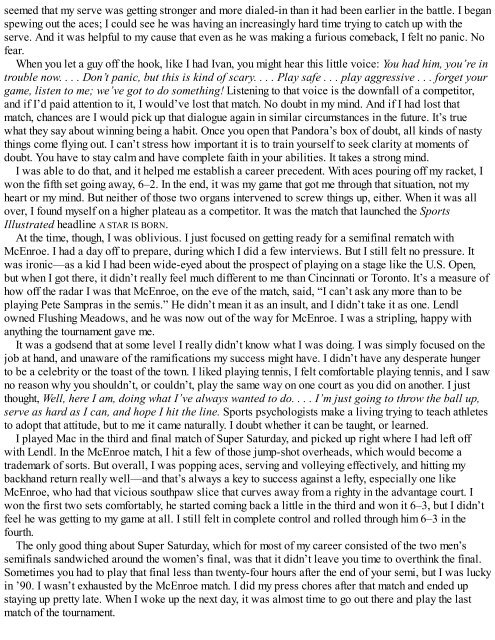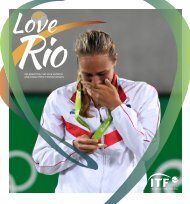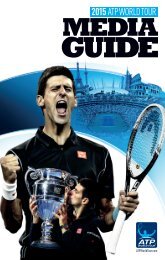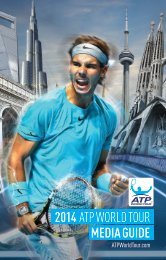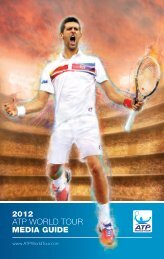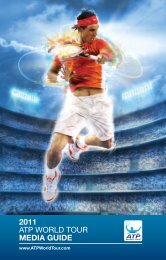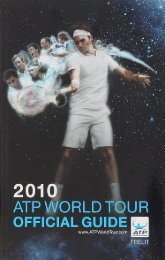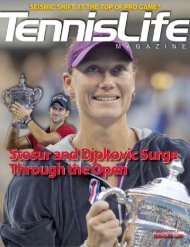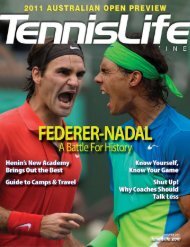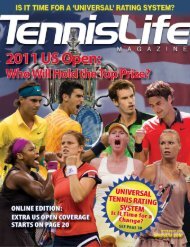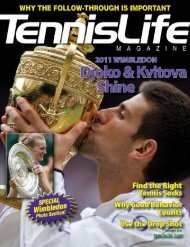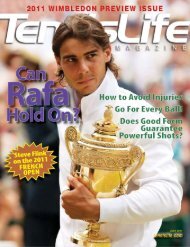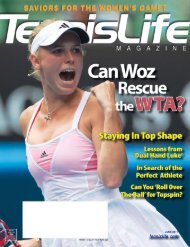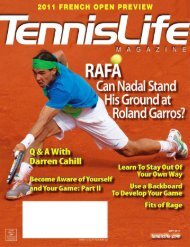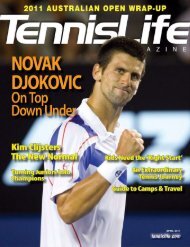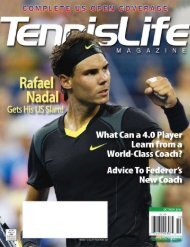A Champion's Mind - Pete Sampras
www.tennismoscow.me Insta:TENNISMOSCOW
www.tennismoscow.me Insta:TENNISMOSCOW
Create successful ePaper yourself
Turn your PDF publications into a flip-book with our unique Google optimized e-Paper software.
seemed that my serve was getting stronger and more dialed-in than it had been earlier in the battle. I began<br />
spewing out the aces; I could see he was having an increasingly hard time trying to catch up with the<br />
serve. And it was helpful to my cause that even as he was making a furious comeback, I felt no panic. No<br />
fear.<br />
When you let a guy off the hook, like I had Ivan, you might hear this little voice: You had him, you’re in<br />
trouble now. . . . Don’t panic, but this is kind of scary. . . . Play safe . . . play aggressive . . . forget your<br />
game, listen to me; we’ve got to do something! Listening to that voice is the downfall of a competitor,<br />
and if I’d paid attention to it, I would’ve lost that match. No doubt in my mind. And if I had lost that<br />
match, chances are I would pick up that dialogue again in similar circumstances in the future. It’s true<br />
what they say about winning being a habit. Once you open that Pandora’s box of doubt, all kinds of nasty<br />
things come flying out. I can’t stress how important it is to train yourself to seek clarity at moments of<br />
doubt. You have to stay calm and have complete faith in your abilities. It takes a strong mind.<br />
I was able to do that, and it helped me establish a career precedent. With aces pouring off my racket, I<br />
won the fifth set going away, 6–2. In the end, it was my game that got me through that situation, not my<br />
heart or my mind. But neither of those two organs intervened to screw things up, either. When it was all<br />
over, I found myself on a higher plateau as a competitor. It was the match that launched the Sports<br />
Illustrated headline A STAR IS BORN.<br />
At the time, though, I was oblivious. I just focused on getting ready for a semifinal rematch with<br />
McEnroe. I had a day off to prepare, during which I did a few interviews. But I still felt no pressure. It<br />
was ironic—as a kid I had been wide-eyed about the prospect of playing on a stage like the U.S. Open,<br />
but when I got there, it didn’t really feel much different to me than Cincinnati or Toronto. It’s a measure of<br />
how off the radar I was that McEnroe, on the eve of the match, said, “I can’t ask any more than to be<br />
playing <strong>Pete</strong> <strong>Sampras</strong> in the semis.” He didn’t mean it as an insult, and I didn’t take it as one. Lendl<br />
owned Flushing Meadows, and he was now out of the way for McEnroe. I was a stripling, happy with<br />
anything the tournament gave me.<br />
It was a godsend that at some level I really didn’t know what I was doing. I was simply focused on the<br />
job at hand, and unaware of the ramifications my success might have. I didn’t have any desperate hunger<br />
to be a celebrity or the toast of the town. I liked playing tennis, I felt comfortable playing tennis, and I saw<br />
no reason why you shouldn’t, or couldn’t, play the same way on one court as you did on another. I just<br />
thought, Well, here I am, doing what I’ve always wanted to do. . . . I’m just going to throw the ball up,<br />
serve as hard as I can, and hope I hit the line. Sports psychologists make a living trying to teach athletes<br />
to adopt that attitude, but to me it came naturally. I doubt whether it can be taught, or learned.<br />
I played Mac in the third and final match of Super Saturday, and picked up right where I had left off<br />
with Lendl. In the McEnroe match, I hit a few of those jump-shot overheads, which would become a<br />
trademark of sorts. But overall, I was popping aces, serving and volleying effectively, and hitting my<br />
backhand return really well—and that’s always a key to success against a lefty, especially one like<br />
McEnroe, who had that vicious southpaw slice that curves away from a righty in the advantage court. I<br />
won the first two sets comfortably, he started coming back a little in the third and won it 6–3, but I didn’t<br />
feel he was getting to my game at all. I still felt in complete control and rolled through him 6–3 in the<br />
fourth.<br />
The only good thing about Super Saturday, which for most of my career consisted of the two men’s<br />
semifinals sandwiched around the women’s final, was that it didn’t leave you time to overthink the final.<br />
Sometimes you had to play that final less than twenty-four hours after the end of your semi, but I was lucky<br />
in ’90. I wasn’t exhausted by the McEnroe match. I did my press chores after that match and ended up<br />
staying up pretty late. When I woke up the next day, it was almost time to go out there and play the last<br />
match of the tournament.


